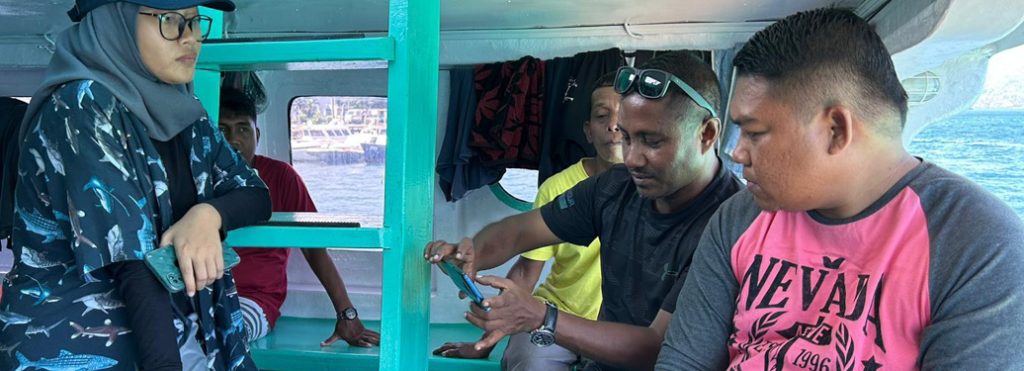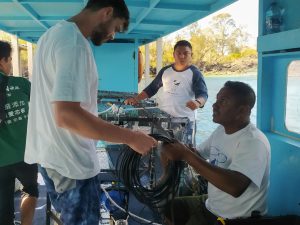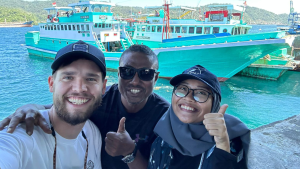By Nur Azizah Charir, IPNLF Sustainability Fisheries Officer, Bitung
Yayasan IPNLF Indonesia (YII) recently hosted their international colleagues from IPNLF Maldives and IPNLF Global in implementing the Darwin Baitfish Project trial plan in Bitung, North Sulawesi. The trial, conducted from August 29 to September 5, 2023, aimed to assess the efficacy of Safety Net Technologies (SNTs) in attracting skipjack tuna using light and sound stimuli to elicit a feeding response. The primary objective of this innovation is to curtail the reliance on livebait when employing pole-and-line fishing methods. A number of local Indonesian pole-and-line fishing vessel captains were invited to take part in the trail to experience the initiative firsthand.

In preparation for the project, the team visited PT Bintang Mandiri Bersaudara, one of the proud owners of pole-and-line fishing vessels in Bitung. Their first stop was on board vessel ‘KM. Venio 03’ skipper by Captain Doni and several crew members who extended a warm welcome. During the teams’ visit, Ibrahim Nadheeh (Senior Fisheries Research Officer from IPNLF Maldives) shared his wealth of experience working with Maldivian pole-and-line vessels with Captain Doni. Nadheeh presented informative videos depicting pole and line fishing activities in the Maldives and elaborated on the bait-catching techniques commonly practiced in the Maldives before heading out to fish.
 It was evident that pole and line fishing techniques in the Maldives differ from those employed in Indonesia. For example, in the Maldives, crew members fish from the stern (back) of the vessel, whereas in Indonesia, they fish from the vessel’s bow (front). Additionally, Maldivian pole-and-line vessels navigating the open sea are equipped with a range of tools, including binoculars, fish finders, and echo sounders (fish finders), to aid in locating fish. Nadheeh emphasized to the fishers that in the Maldives, it is quite rare to fish for skipjack at Fish Aggregating Devices (FADs). Captain Doni then pointed out that catching skipjack outside of FADs can be quite challenging in Indonesia, with only certain months like March or November providing favourable conditions.
It was evident that pole and line fishing techniques in the Maldives differ from those employed in Indonesia. For example, in the Maldives, crew members fish from the stern (back) of the vessel, whereas in Indonesia, they fish from the vessel’s bow (front). Additionally, Maldivian pole-and-line vessels navigating the open sea are equipped with a range of tools, including binoculars, fish finders, and echo sounders (fish finders), to aid in locating fish. Nadheeh emphasized to the fishers that in the Maldives, it is quite rare to fish for skipjack at Fish Aggregating Devices (FADs). Captain Doni then pointed out that catching skipjack outside of FADs can be quite challenging in Indonesia, with only certain months like March or November providing favourable conditions.
One of the recurring challenges associated with pole-and-line fishing is the availability of bait. Both in the Maldives and Indonesia, the technique of catching bait is typically performed at night using artificial lights. Nevertheless, a key distinction lies in the bait acquisition process. In the Maldives, bait is harvested in the open sea, and there are no associated costs. Conversely, in Indonesia, especially in Bitung, livebait must be purchased from a ‘bagan’ (floating fishing platforms), with prices contingent on the season. Captain Doni explained that during the bait season, the cost per bucket is Rp. 150,000, but outside of the season, it can range from Rp. 250,000 to Rp. 300,000 per bucket. In the Maldives however, although bait is free, there is considerable wastage, necessitating the need for training in livebait best practices.
The aspirations for the Darwin baitfish trial is to offer a sustainable solution for the responsible management and reduction of bait usage. The endeavour seeks to ensure the continued sustainability of bait resources and the perpetuation of the pole and line fishing tradition for generations to come.

IPNLF team from three different geographies